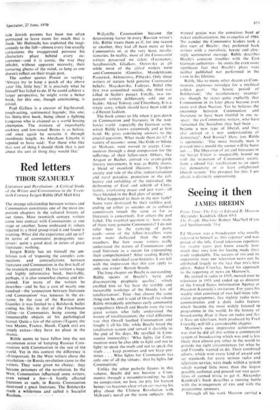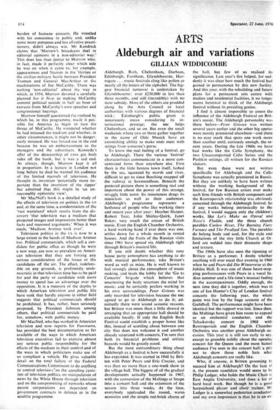Seeing it then
JAMES BREDIN
Prime Time: The Life of Edward R. Murrow Alexander Kendrick (Dent 65s) The People Machine Robert MacNeil (Eyre and Spottiswoode 55s) Ed Murrow was a broadcaster w ho usually referred to himself as 'this reporter' and was proud of the title. Good television reporters for twenty years past know exactly how much they owe him for having made their trade respectable. The success of ITN and its superiority over Bac television news can be attributed largely to the fact that ITN's first editor, Aidan Crawley, based his approach to the reporting of news on Murrow's.
He started in radio in 1935, moved over to television in 1951 and ended up as director of the United States Information Agency at President Kennedy's invitation. For years his weekly stint consisted of two half-hour tele- vision programmes, five nightly radio news commentaries and a daily radio feature which became the most widely listened to programme in the world. In the history of broadcasting Hear it-Now on radio and See it Now on television, both produced by Fred Friendly,-will fill a considerable chapter.
Murrow's most impressive achievement was that he did all this within a commercial system of broadcasting which was and is less likely than almost any other in the world to provide the right circumstances for what he and Friendly wanted to do. Their combined efforts, which won every kind of award and set standards for every serious radio and television service, were made within a system which wanted little more than the largest possible audience and poured out vast quan- tities of canned trivia to get it. Alexander Kendrick's book describes a running battle with the management of CBS and with the programme sponsors.
Through all his work Murrow carries) a burden of humane concern. He wrestled with his conscience in public and, unlike some more pompous and less effective practi- tioners, didn't always win. Mr Kendrick claims that 'Murrow's broadcasts deal in editorial opinions in a non-editorial way.' This does less than justice to Murrow who, in fact, made it perfectly clear which side he was on when it came to, for example, appeasement and Nazism in the 'thirties or the civilian-military battle between President Truman and General MacArthur, or the machinations of Joe McCarthy. There was nothing 'non-editorial' about the way in which, in 1954, Murrow devoted a carefully planned See it Now to making McCarthy commit political suicide in half an hour of extracts from McCarthy's own speeches and congressional hearings.
Murrow himself questioned the method by which he, in this programme, made it pos- sible for America to begin to face the threat of McCarthy. He wondered whether he had misused the medium and whether, in other circumstances, it might not be danger- ously misused. He was forced out in the end because he was an embarrassment to the managers and the advertisers. Kennedy's offer of the directorship of USIA got both sides off the hook, but it was a sad end. As always, though, Murrow kept it all in proportion. In a lecture in London not long before he died he warned his audience of the limited marvels of television. He thought its invention 'potentially more im- portant than the invention of the zipper' but admitted that this might be 'an un- reasonably optimistic view'.
Mr MacNeil's book is a detailed study of the effects of television on politics in the us and, at the same time, a condemnation of the 'vast wasteland' which results from the dis- covery 'that television was a medium that projected images and impressions better than facts and reasoned arguments.' When it was made, 'Madison Avenue took over'.
Television politics in the us is now to a large extent in the bands of Madison Avenue too. Political commercials, which sell a can- didate for public office as though he were a new soap, are now so prevalent on Ameri- can television that they are forcing any serious consideration of the issues or the candidates off the air. The effect, indefens- ible on any grounds, is profoundly unde- mocratic in that television time has to be paid for and the party or candidate with more money to spend has an advantage over the opposition. It is a measure of the depths to which American television and public life have sunk that hardly anyone in either field suggests that political commercials should be prohibited. It has, rather, been seriously proposed, by President Johnson among others, that political commercials be paid for, somehow, with public money.
Mr MacNeil, who has worked in American television and now reports for Panorama, has provided the best documentation so far available of the ways in which American television executives fail to exercise almost any serious public responsibility for the effects of the medium in their control and of the ways in which politicians make use of so compliant a vehicle. He gives valuable detail on the total failure of the Federal Communications Commission to do anything to control television,4on the appalling cynic- ism of television politics, on manipulation of news by the White House through television and on the compromising of networks whose parent 'corporations are dependent on government contracts in defence or in the satellite programme.































 Previous page
Previous page